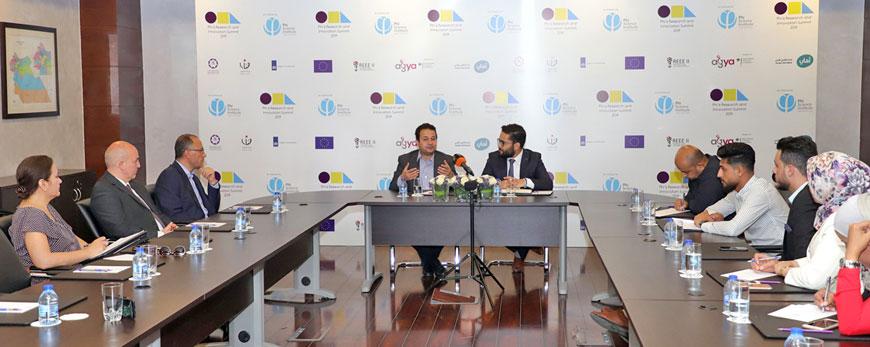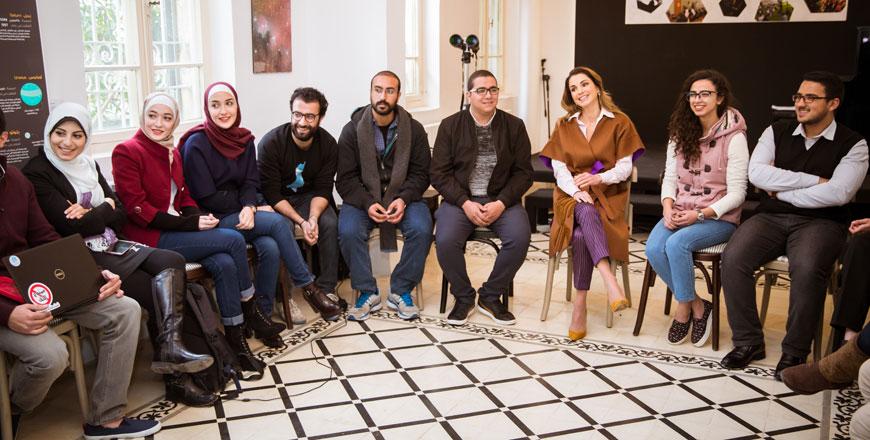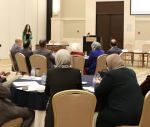You are here
Science club seeks to spread culture of scientific research, support students
By Bahaa Al Deen Al Nawas - Aug 18,2015 - Last updated at Aug 18,2015

Participants at the Phi First Scientific Research Conference attend a workshop at the Jubilee School in Amman on Saturday (Photo courtesy of Phi Science Club)
AMMAN — Ahmad Jadallah, a medical student at the Hashemite University, said his seventh grade science teacher “did not teach students properly”, and at the end of the year, it was his father who taught him everything and helped him pass the final exam.
That incident made him determined to teach science to those who seek it and make learning a pleasant experience for students.
In pursuance of his dream, Jadallah launched the Phi Science Club last year, dedicated to teaching science in an easy and simple manner, and conducting scientific research.
The club began its activities with a few members and small workshops.
With more workshops being held, the club started gaining a wider audience, which pushed it to take “its biggest step forward into scientific research”, by organising the Phi First Scientific Research Conference on Saturday.
The goal of holding the conference is to produce a minimum of 40 research papers, with the work of around 10 per cent of the nearly 450 attendees, according to Jadallah.
The club team, currently consisting of 70 members, organised the conference at Jubilee School, with the support of the Abdul Hameed Shoman Foundation, inviting expert lecturers to speak about scientific research.
University of Jordan engineering professor Ali Nayfeh, recipient of the 2014 Benjamin Franklin Medal in mechanical engineering, delivered a lecture at the beginning of the conference.
“Science is a nation’s power in economy, medicine, and all fields,” Nayfeh said, focusing on the importance of self-learning and basic sciences.
He urged students to look for available scholarships to study abroad, and invited any student in need of financial assistance to visit his office at the university to receive guidance and help.
The conference included lectures by six professors who have their own published research papers and articles.
The lectures covered motivation to conduct scientific research, the current situation of research in Jordan and the steps of conducting research.
Moreover, lectures covered how to obtain funding and support in Jordan and the world, for students and fresh graduates who want to do research, and the importance of creativity and innovation in the whole process.
A scientific exhibition and bazaar were also part of the conference, aimed at showing students scientific inventions in different fields.
Fourteen workshops also took place simultaneously in the school’s classrooms, covering research in a variety of topics such as biology, mathematics, genetics and nanotechnology, mechanical engineering, biotechnology, chemistry, pharmacology, computer science and economics.
Joman Khallad, a nutrition student at Jordan University of Science and Technology, said the conference was “great and beneficial”, adding that she had an idea in her mind for scientific research and did not know where to start, but the conference gave her a clear idea of what to do next.
Throughout the conference, partners, professors and winners of the club’s social media Ramadan science competition, were honoured with plaques and gifts.
The Phi Science Club is planning to organise a similar conference next year to follow up on the research projects that were planned this year, according to Jadallah, who voiced hope that at least 40 research papers will be published by then to contribute to increasing Jordan’s ranking in research indexes.
Related Articles
AMMAN — Jordan spends 0.4 per cent of its GDP on scientific research, at an average of $1 per individual compared with $700 in the US, the P
AMMAN — Her Majesty Queen Rania met with members of the Phi Science Institute in Amman on Monday to learn about its efforts in promoting inn
AMMAN — There is a need for further collaboration between the public and private sectors to establish the infrastructure necessary to promot


















